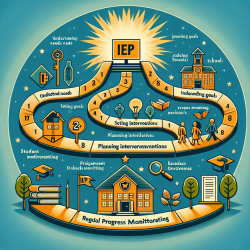Individualized Education Programs (IEPs) can significantly improve student outcomes. The newly mandated IEP process and form in Massachusetts represent a major step forward in providing services to students with disabilities and enhancing their success.
The revision of the IEP process fosters collaboration and aligns with statutory and regulatory requirements. The clear intent is to ensure that all students are challenged to excel, progress within the general curriculum, and prepare for independence in adult life, including post-secondary education and employment.
Key Points of IDEA-97
- Involvement and progress of each child with a disability in the general curriculum.
- Involvement of parents, students, special educators, and general educators in meeting individualized educational needs.
- Preparation of students with disabilities for independence and employment.
IDEA-97 emphasizes that improving educational results for children with disabilities is essential to ensuring equal opportunity, full participation, independent living, and economic self-sufficiency.
Massachusetts Education Reform Act
The Massachusetts Education Reform Act of 1993 sets high standards for all students, including those with disabilities. It reinforces the need to help all children reach their full potential and lead lives as active participants and contributors to the Commonwealth.
The IEP Process
The Massachusetts IEP process aligns with federal and state laws and includes three critical steps:
- Eligibility Determination: Evaluating the child in all areas of suspected disabilities to determine eligibility for special education services.
- Development of the IEP: Discussing, planning, and capturing the elements of the IEP in a written document, with input from parents, students, general educators, and special educators.
- Placement Decision: Deciding the placement that best meets the student's needs, with the first option being the general education classroom.
Collaboration is Key
IDEA-97 emphasizes a collaborative approach, bringing together parents, students, general educators, and special educators to make important educational decisions. Parents are equal partners in the Team process and have the right to be involved in meetings that discuss their child's identification, evaluation, IEP development, and educational placement.
Student Participation
Students are also important members of Team meetings. As they get older, they should become more active, with their interests and preferences guiding the IEP goals and services. Supporting active student participation helps develop self-determination skills necessary for adult life.
General Educators' Role
General educators play a central role in the IEP process, providing expertise on the general curriculum and how to modify it to ensure that students with disabilities can participate and make progress.
Sound Practices
- Send evaluation material home in advance and ask parents to develop a list of questions and concerns.
- Contact parents before meetings to discuss their concerns.
- Provide parents with a seating plan or use name signs/nametags.
- Introduce and refer to all Team members by name, not role.
- Establish methods for communication of general and special education information with parents.
- Recruit parents of children eligible for special education services to serve on school-wide parent groups.
For more information, please follow this link.










